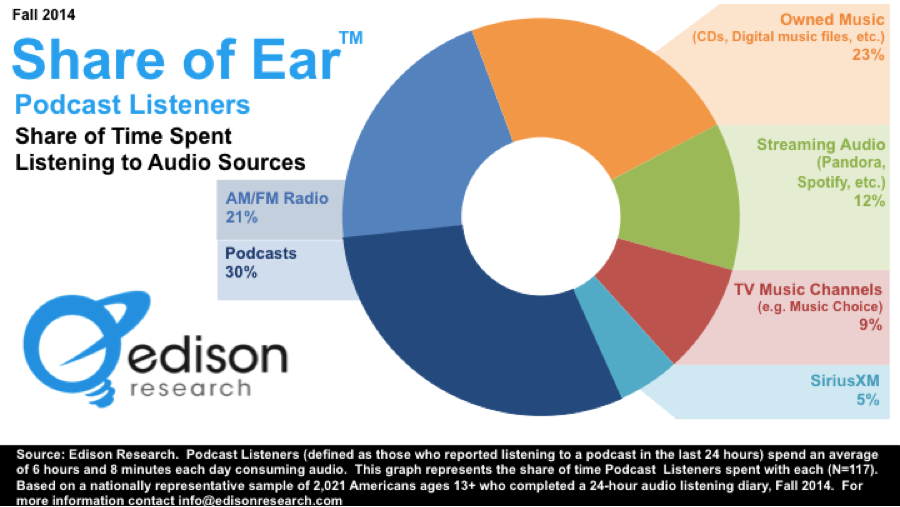Serial, the This American Life spin-off podcast phenomenon, debuted in October 2014 and went viral. People tuned in weekly to hear host Sarah Koenig discuss the infamous case of high school student Hae Min Lee’s 1999 murder and the conviction of her ex-boyfriend Adnan Syed.
The explosive popularity of the podcast was surprising to non-podcast listeners, but it shouldn’t have been. Edison Research’s Fall 2014 Share of Ear study shows that podcasting’s popularity continues to surge. Edison’s study found that total “share of ear” of podcasting, amongst all Americans, increased by 18 percent in six months.
Americans listen to approximately 21,117,000 hours of podcast audio every day. Podcasts also have an intimate relationship with listeners. Listeners invite podcasters into their earbuds during workouts, commutes, and other private spaces. That close relationship has many businesses wondering whether to add podcasting to their content marketing mix. Is it the right choice for your company? Let’s look at the pros and cons of podcasting.
Pros Of Podcasting
Unlike other forms of media, listeners tend to give podcasts exclusive attention and time. Listeners tune in during workouts, commutes, and other slices of free time. Other forms of media, such as blog posts and video, are subject to many distractions.
Edison Research’s report also discovered that for those who listen to podcasts, they listen to podcasts more than any other form of audio, including AM/FM radio and owned music. What does that tell us as marketers? Create a quality podcast and you’ll build a loyal base of listeners that will keep coming back for more.
Podcasting’s exclusivity isn’t just limited to time. Unlike broadcast media, a listener of your podcast will not hear messages from your competitors. When they tune into your show, they’re tuning in to you only. For marketers in fiercely competitive industries, this can cement loyalty to your brand.
As a form of digital media, we are able to measure podcast listenership with more accuracy than non-digital audio. We can track the number of downloads of individual episodes as well as subscribership to our shows. This level of accuracy allows us to see the immediate impact of our efforts.
Cons Of Podcasting
Podcasting has many benefits, but those benefits aren’t free. Putting together a podcast requires time, money, and significant labor.
As a form of media, you must deliver a podcast on a regular schedule. Mainstream media has conditioned listeners to expect content delivered on a predictable, frequent basis, as often as weekly. Your publication schedule must mirror those expectations, and podcast production demands time. For every minute of podcast audio that the listener hears, expect to spend between 5-15 minutes of your time producing it.
Podcasting needs more equipment and resources than other forms of content marketing. To produce a quality podcast, you’ll need a microphone, audio editing software, and podcast hosting services. That’s just for the production of the podcast; you’ll need marketing services on top of the production services.
For example, you’ll need to market your podcast like a product. That means you’ll need to:
- Develop an editorial calendar and marketing plan.
- Put up a dedicated landing page or website.
- Create marketing collateral such as email newsletters promoting the show.
- Set up cross-promotion in App Stores and content networks such as Google Play, iTunes, and Stitcher Radio.
Conclusion
Podcasting can be an amazing channel to reach your audiences. It can build loyalty and positive sentiment towards your brand. That said, podcasting isn’t without significant costs and tradeoffs. Be sure you weigh the pros and cons before jumping in.
What other pros and cons can you think of for podcasting? Did Serial give your company the podcasting bug? Share your thoughts with us in the comments below!
